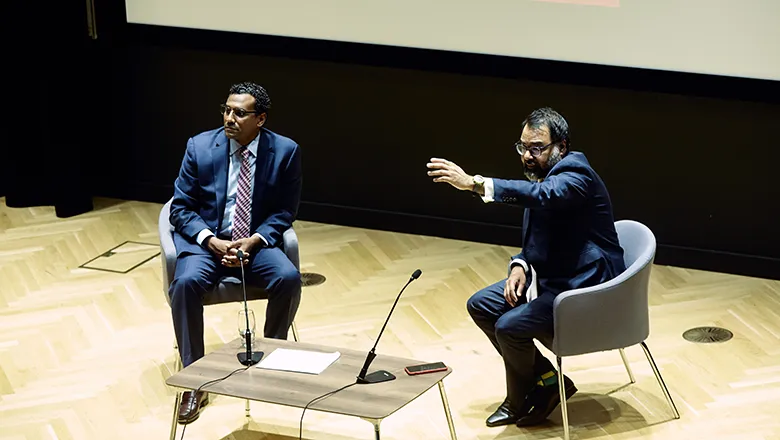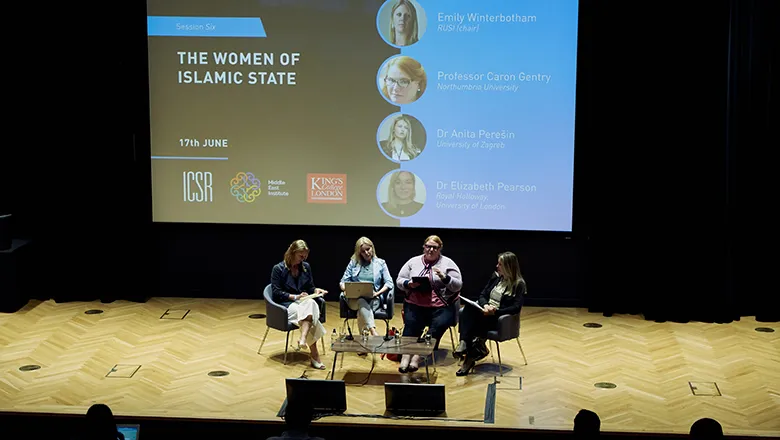01 July 2022
King's holds major conference to find solutions to the ISIS men, women and children detained in Syria
Policymakers, diplomats and high-profile commentators gathered to discuss what to do about the thousands of ISIS detainees.

Policymakers, diplomats, experts and high-profile commentators gathered recently to discuss what to do about the thousands of ISIS detainees imprisoned in north-eastern Syria.
The major two-day conference, organised by the International Centre for the Study of Radicalisation (ICSR), in the Department of War Studies, aimed to find solutions to the major crisis, which has largely been overlooked by the international community for the last three years.
Alongside panels featuring policymakers, diplomats and experts in counterterrorism and international law, keynote speakers included Anthony Loyd, the Times journalist who first discovered schoolgirl Shamima Begum in an ISIS camp in Syria, Diane Foley, mother of James Foley, American journalist murdered by ISIS, and Omar Mohammed, a historian from Mosul, known until recently as the anonymous blogger 'Mosul Eye'.
Marking the first serious attempt to resolve the ISIS detainee dilemma, the event was the first of two major transatlantic conferences, organised by the ICSR at King’s in partnership with the Middle East Institute in Washington DC. The second conference will take place in Washington on 13 July.

With more than three years having passed since the territorial defeat of ISIS, 12,000 male fighters and more than 60,000 women and children remain in makeshift prisons and poorly resourced, squalid camps in Syria. This is an increasingly unsustainable security and humanitarian crisis.
The conference in London sought to explore the many layers of complexity surrounding the crisis, from the challenges of prosecuting foreign fighters to managing terrorist offenders, disengaging and reintegrating child soldiers, and rehabilitating returnees.
It also looked at the acute political, diplomatic and security barriers to considering repatriating former ISIS members to their home countries. The conference revealed clear obstacles as well as opportunities for clear progress.
Contributing to the discussions were representatives of multiple governments, as well as practitioners in law enforcement, countering violent extremism, humanitarian assistance, analysts and academics.
In a keynote address, Deputy Coordinator for Counterterrorism from the US State Department, lan Moss, reiterated the US Government's determination to see foreign governments repatriate their citizens from Syria, to avoid the risk of an ISIS resurgence amongst escapees from the poorly guarded prisons in the region.
Diane Foley of the James W. Foley Legacy Foundation, in conversation with Sunday Times journalist, Christina Lamb OBE, shared her experience of meeting one of her son’s abductors in prison, and how he came “close to an apology” for her son’s death. James Foley was abducted by an ISIS gang while reporting on the Syrian civil war in 2012. He was later killed by another of the gang in 2014.
Of the repatriated detainees she said:
“They’ve lost their citizenship and their freedom for the rest of their life and to me that’s a very just punishment. I feel that it gives them the opportunity to make amends and use the years for some good but it also doesn’t allow them to be free to inflict any more horror.”
Other panels and discussions made clear that whilst a challenge, valuable lessons have been learned that make the repatriation, deradicalisation and reintegration of ISIS detainees in their home countries, a feasible objective. Furthermore, international mechanisms for effectively and efficiently sharing intelligence and battlefield evidence, are enhancing the capacity of home governments to prosecute returnees complicit in terrorist crimes abroad.
Following the conferences in London and Washington DC, the ICSR and MEI will be producing a policy paper informed by the many panels and high-level discussions that took place, in order to set out practical solutions for the international community to the ongoing impasse.

